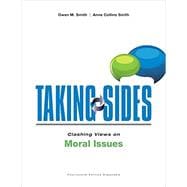
Note: Supplemental materials are not guaranteed with Rental or Used book purchases.
Purchase Benefits
What is included with this book?
| Table of Contents Taking Sides: Clashing Views on Moral Issues, 14/e Expanded Unit: Is Moral Relativism Correct?
|